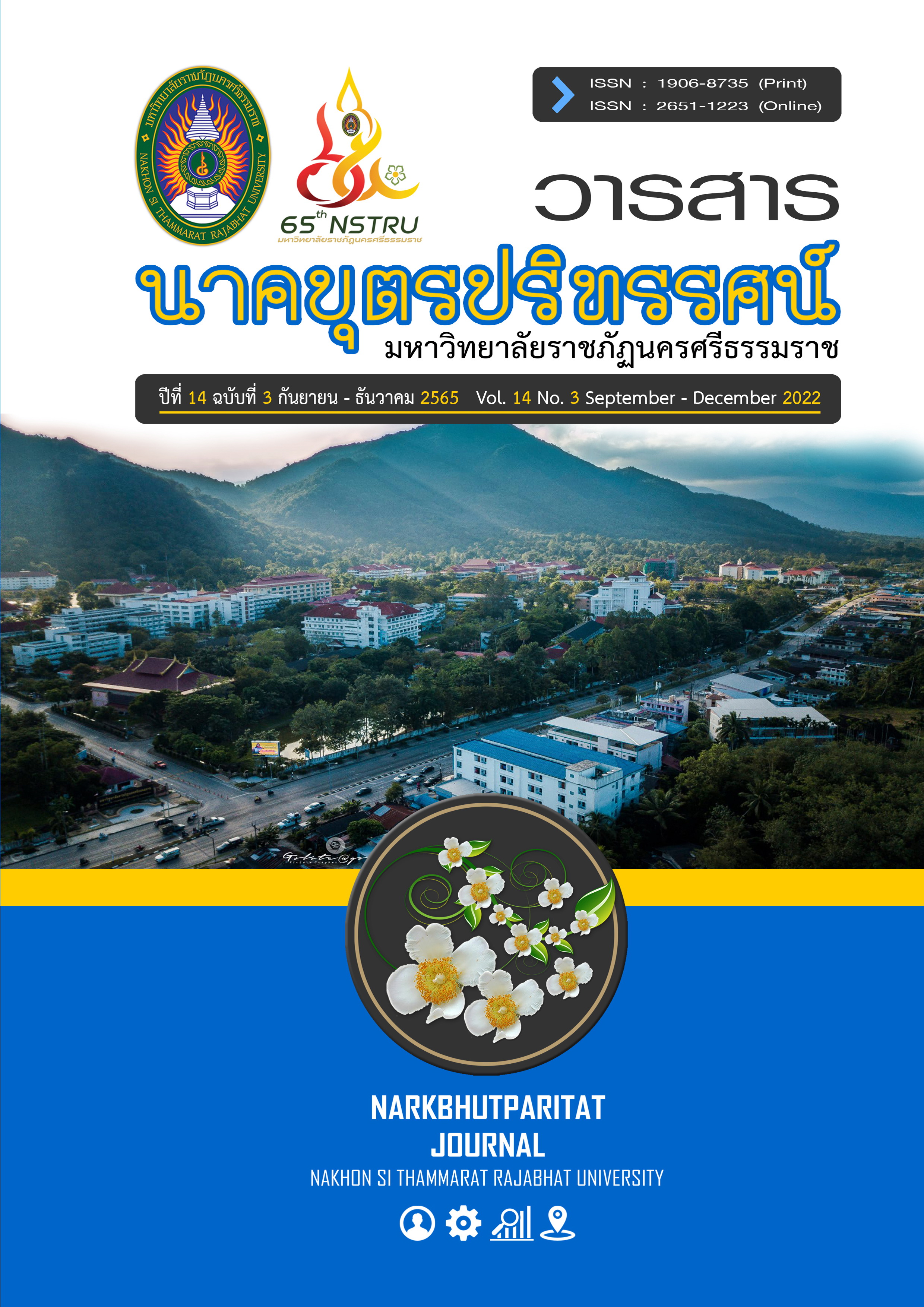แผนยุทธศาสตร์แบบบูรณาการเพื่อพัฒนาการท่องเที่ยวเชิงสร้างสรรค์ ที่ยั่งยืนในจังหวัดราชบุรี
Main Article Content
บทคัดย่อ
การวิจัยเรื่องแผนยุทธศาสตร์แบบบูรณาการเพื่อพัฒนาการท่องเที่ยวเชิงสร้างสรรค์ที่ยั่งยืนในจังหวัดราชบุรี
มีวัตถุประสงค์ (1) เพื่อศึกษาศักยภาพการพัฒนาการท่องเที่ยวเชิงสร้างสรรค์ในจังหวัดราชบุรี และ (2) เพื่อสร้างแผนยุทธศาสตร์แบบบูรณาการเพื่อพัฒนาการท่องเที่ยวเชิงสร้างสรรค์ที่ยั่งยืนในจังหวัดราชบุรี เป็นการวิจัยเชิงคุณภาพ เครื่องมือที่ใช้วิจัย ได้แก่ รายการตรวจสอบชุมชนศึกษา รายการตรวจสอบทรัพยากรท่องเที่ยว แบบสัมภาษณ์เชิงลึก
และการประชุมกลุ่มย่อย เก็บข้อมูลจากกลุ่มตัวอย่าง ได้แก่ ผู้แทนจากภาครัฐ เอกชน ประชาชน และนักท่องเที่ยว จำนวน 32 คน วิเคราะห์ข้อมูลเชิงเนื้อหาและตรวจสอบข้อมูลแบบสามเส้า ผลการวิจัยพบว่า (1) ศักยภาพการพัฒนาการท่องเที่ยวเชิงสร้างสรรค์ในจังหวัดราชบุรี ได้แก่ จังหวัดราชบุรีมีความหลากหลายทางชาติพันธุ์ (ไทยกะเหรี่ยง ไทยเขมร ไทยเชื้อสายจีน ไทยทรงดำ ไทยพื้นถิ่น ไทยมอญ ไทยยวน และไทยลาวเวียง) มีการสืบทอดวัฒนธรรมชาติพันธุ์
อย่างต่อเนื่องมาจนถึงปัจจุบัน มีทรัพยากรท่องเที่ยวทางธรรมชาติ ทรัพยากรท่องเที่ยวทางวัฒนธรรม ทรัพยากรท่องเที่ยวด้านมหกรรม เทศกาล และประเพณี และทรัพยากรท่องเที่ยวกิจกรรมที่หลากหลาย สามารถต่อยอดเป็นการท่องเที่ยวเชิงสร้างสรรค์ได้ (2) แผนบูรณาการเชิงยุทธศาสตร์เพื่อพัฒนาการท่องเที่ยวเชิงสร้างสรรค์ที่ยั่งยืนในจังหวัดราชบุรี มีวิสัยทัศน์ ได้แก่ จังหวัดราชบุรีจะสร้างแบรนด์ท่องเที่ยวเชิงสร้างสรรค์เพื่อพัฒนาเศรษฐกิจ จะสร้างแบรนด์ท่องเที่ยววัฒนธรรมเชิงสร้างสรรค์เพื่อพัฒนาจิตใจ จะสร้างแบรนด์ท่องเที่ยวเพื่อพัฒนาสังคมเชิงสร้างสรรค์ และจะสร้างแบรนด์ท่องเที่ยวธรรมชาติเชิงสร้างสรรค์เพื่ออนุรักษ์สิ่งแวดล้อม ประกอบด้วยยุทธศาสตร์การพัฒนาการท่องเที่ยว
เชิงสร้างสรรค์เพื่อพัฒนาเศรษฐกิจ ยุทธศาสตร์การพัฒนาการท่องเที่ยวเชิงสร้างสรรค์เพื่ออนุรักษ์วัฒนธรรมและ
พัฒนาจิตใจ ยุทธศาสตร์การพัฒนาการท่องเที่ยวเชิงสร้างสรรค์เพื่อพัฒนาสังคม และยุทธศาสตร์การพัฒนาการท่องเที่ยวเชิงสร้างสรรค์เพื่ออนุรักษ์สิ่งแวดล้อม
Article Details

อนุญาตภายใต้เงื่อนไข Creative Commons Attribution-NonCommercial-NoDerivatives 4.0 International License.
เอกสารอ้างอิง
Chantavanich, S. (2010). Qualitative Research Methodology. Bangkok: Chulalongkorn University Press. (in Thai)
Cooper, C. (2020). Essentials of Tourism (Third Edition). California: SAGE Publications Ltd.
Dhamabutra, P. (2019). Creative Tourism Textbook. Bangkok: College of Management, University of Phayao. (in Thai)
Khemthong, S. (2017). Unit 1: Introduction to Marketing, Tourism and Hospitality. Teaching Document for Tourism and Hotel Marketing Management Series Vol 1. Nonthaburi: Sukhothai Thammathirat Open University Press. (in Thai)
Klaus, S. (2018). The Fourth Industrial Revolution. (Mekpaiboon, S., Trans). Bangkok: Amarin Printing and Publishing. (in Thai)
Kongjareon, M. (2010). Development of Empowerment Model for Community To strengthen the sustainability of the learning community. (Doctor of Education). Chulalongkorn University, Faculty of Education. (in Thai)
Lincharoen, A. (2012). Qualitative data Analysis Techniques. Journal of Educational Measurement, Mahasarakham University, 17(1), 17–29. (in Thai)
McMillan, J.H. & Schumacher, S.S. (1997). Research in Education A Conceptual Introduction. New York: Longman.
Ministry of Tourism and Sports. (2017). Strategy of the Ministry of Tourism and Sports No. 4 (2017-2021). Retrieved 2020, January 10, from http://www. mots.go.th/ewt_dl_link.php?nid=9690. (in Thai)
National Strategy Committee Office of the National Economic and Social Development Board. (2018). The 20-Year National Strategy (2018-2037). Retrieved 2020, October 2, from https://www.moac.go.th/news-files-401391791008. (in Thai)
Office of the National Economic and Social Development Board. (2017). National Economic and Social Development Plan Vol. 12 (2017-2021). Retrieved 2020, October 3, from http://www.nesdb.go.th/ewt_dl_link.php?nid=6422. (in Thai)
Pharmaceutical Information Center, Ministry of Public Health. (2020). Measures to prevent and stop the spread of Coronavirus Disease 2019 (COVID-19) during the holidays of May 2020 (O194). Retrieved 2021, March 10, from http://dmsic.moph.go.th/ index/detail/8159. (in Thai)
Pongthongcharoen, P. (2022). Director of Sustainability Management Division, Tourism Authority of Thailand. Interview, 23 July 2020. (in Thai)
Puntasen, A. (2004). Buddhism: Evolution, Theory, and Its Applications with Economics in Various Fields. n.p. (in Thai)
Sawangsri, K. (2018). Ethnic Diversity in Ratchaburi Province. In The 10th NPRU National Academic Conference, (p. 1150). Nakhon Pathom: Nakhon Pathom Rajabhat University. (in Thai)
Strategy and Information for Provincial Development Unit, Ratchaburi Provincial Office. (2018). 5 Years Provincial Development Plan (2018-2022). Retrieved 2020, September 3, from http://www.ratchaburi.go.th/plan-2551/p_61-65/approve_2564/approve_25 64.pdf. (in Thai)
Tapscott, D. (1994). Digital Economy. New York: Mc Graw-Hill.
Termpittayapaisith, A. (2011). Thailand's Creative Economy. Retrieved 2020, September 27, from http://www.nesdb.go.th/ewt_w3c/ ewt_dl_link.php?nid=2774. (in Thai)
Tourism Authority of Thailand. (2015). TAT Launched 12 Must-Visit Cities. Retrieved 2020, October 12, from https://issuu.com/ etatjournal/docs/tat12015. (in Thai)
Wisansing, J. (2018). Guidelines to Develop and Enhance Creative Tourism Activities. Bangkok: Book Plus Publishing. (in Thai)
Wisudthiluck, S. (2013). Creative Tourism. Bangkok: The Designated Areas for Sustainable Tourism Administration (DASTA). (in Thai)
Wisudthiluck, S., Saiphan, P., Teparakul, O. & Sindecharak, T. (2017). Creative Tourism Achievement in Thailand: Evaluated by Experts and Tourists. Thammasat Review, 19(1), 75-87.


